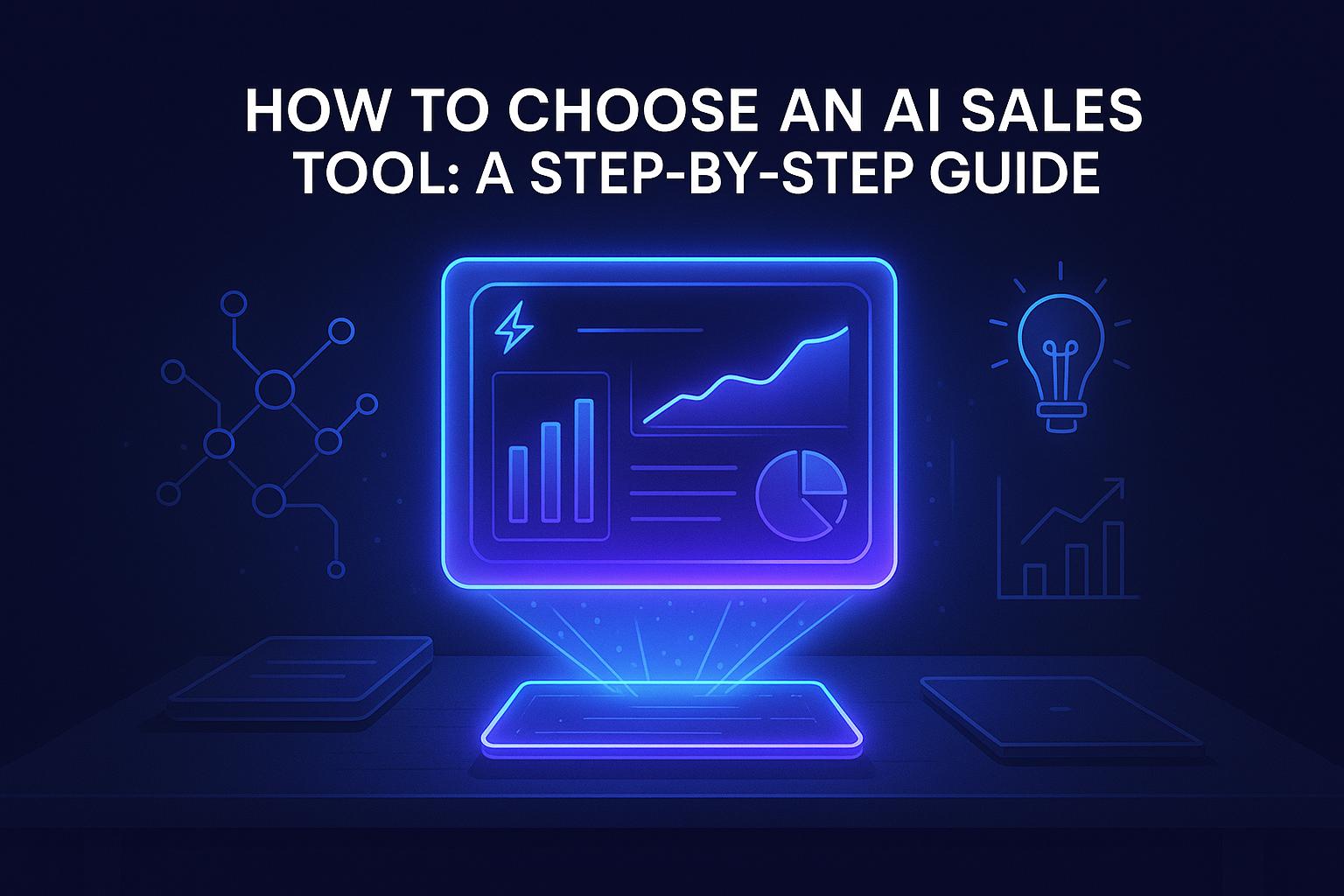AI is transforming CRM systems into tools that not only store customer data but also provide actionable insights, automate tasks, and improve decision-making. Here’s a quick overview of what AI-powered CRMs can do for your business:
- Automate repetitive tasks like data entry and lead scoring, saving time.
- Provide smart insights into customer behavior and sales trends.
- Personalize customer experiences with tailored messaging and proactive support.
- Enhance decision-making using predictive analytics and revenue intelligence.
Key Features of AI-Powered CRMs:
| Feature | What It Does | Benefit |
|---|---|---|
| Revenue Intelligence | Analyzes customer conversations | Actionable sales insights |
| Predictive Analytics | Forecasts sales outcomes | Better decision-making |
| Automated Prospecting | Finds and qualifies leads | Saves time on manual tasks |
| Sales Coaching | Real-time guidance | Improves team performance |
To successfully integrate AI into your CRM:
- Identify areas where AI can help, like reducing data entry or improving lead scoring.
- Choose tools that integrate well with your system and meet your business needs.
- Roll out changes gradually, starting with a pilot program, and monitor performance.
For long-term success, keep your data accurate, train your team on AI features, and regularly review system performance to maximize ROI. AI-powered CRMs can help you build stronger customer relationships and drive better sales outcomes.
How to Integrate AI into Your CRM Strategy
Main Advantages of AI-Powered CRM
AI integration is reshaping CRM by improving how businesses manage customers and drive sales. Let’s dive into how AI boosts the effectiveness of CRM systems.
Automated Task Management
AI takes care of repetitive tasks like data entry and lead scoring, cutting down the time spent on administrative work. This allows sales teams to focus on strategic activities and meaningful interactions. By automating these processes, teams can concentrate on building stronger customer relationships.
Enhancing the Customer Experience
AI-powered CRM systems analyze vast amounts of customer data to create personalized experiences. They process interaction data to ensure timely and relevant communication. Some of the standout features include:
- Tailored Messaging and Timing: AI determines the best times to reach out and crafts messages that resonate with individual customers.
- Proactive Support: Using predictive analytics, these systems can identify potential issues early, helping businesses address them before they grow into larger problems.
Driving Better Business Decisions
AI turns raw CRM data into actionable insights, helping businesses make smarter choices. Key benefits include:
- Revenue Intelligence: By examining customer interactions, AI uncovers patterns that lead to successful sales strategies.
- Predictive Analytics: AI uses historical data to forecast sales trends, allowing teams to focus on the most promising opportunities.
- Performance Insights: Continuous monitoring helps AI pinpoint areas for improvement and suggest training opportunities for team members.
For more information on AI-driven CRM tools and a curated list of solutions, visit TopAISalesTools.com.
How to Add AI to Your CRM System
Identify Your CRM Requirements
Start by evaluating how your current CRM system performs and pinpointing its weaknesses. Focus on areas where AI can make a noticeable difference. Create a list of priorities, such as:
- Reducing time spent on data entry
- Improving lead scoring accuracy
- Tracking customer engagement more effectively
- Enhancing sales forecasting
- Speeding up responses to customer inquiries
Set SMART goals (Specific, Measurable, Achievable, Relevant, Time-bound) for each issue. For example, if data entry is slowing your team down, you might aim to "Cut data entry time by 75% within three months using AI automation."
Select AI Tools for Your Needs
When picking the right AI tools for your CRM, focus on these key factors:
| Selection Criteria | Description | Priority Level |
|---|---|---|
| Integration Capability | Works seamlessly with your current CRM system | High |
| Scalability | Can grow alongside your business | High |
| User Interface | Easy for your team to navigate | Medium |
| Data Security | Keeps customer information protected | High |
| Cost-effectiveness | Balances pricing with ROI potential | Medium |
Check out TopAISalesTools.com for a detailed directory of AI-powered CRM tools. It offers options tailored to various needs, like sales intelligence, analytics, and conversation intelligence.
Create a Step-by-Step Roll-out Plan
Follow a structured plan to implement your AI-enhanced CRM system effectively:
1. Pilot Program Launch
Begin with a small group of 5-10 users to test the new AI features. This controlled trial helps identify potential problems and gather feedback without affecting the entire team.
2. Phased Implementation
Introduce AI features gradually, focusing on the most important ones first:
- Week 1-2: Automate data entry tasks
- Week 3-4: Add lead scoring tools
- Week 5-6: Enable analytics and reporting
- Week 7-8: Roll out advanced AI functionalities
3. Performance Monitoring
Measure key metrics during each phase, such as:
- How quickly users adopt the system
- Time saved on repetitive tasks
- Lead conversion improvements
- Customer satisfaction levels
- ROI from the changes
Document feedback and challenges at every stage. This will help you fine-tune the system and create better training materials for future users.
sbb-itb-3ed3a29
Managing AI-Enhanced CRM Systems
Once you've integrated AI into your CRM, keeping it running smoothly is essential for long-term success.
Keep Data Accurate
The quality of your data directly impacts AI performance. Here's how to maintain it:
-
Set up validation rules to catch errors, such as:
- Standardizing phone numbers and email formats
- Flagging duplicate entries
- Ensuring proper address formatting
- Verifying company details
- Schedule regular data cleanups to remove duplicates, update outdated information, verify details, and archive inactive records.
You can also use AI-powered data enrichment tools to keep your customer information up to date. These tools can verify details like company revenue, employee count, social media activity, recent news, and industry classifications.
Training Your Team
To get the most out of your AI-enhanced CRM, continuous employee training is crucial. Here's a phased approach to training:
-
Foundation Training
Teach employees about advanced features such as:- AI-assisted customer segmentation
- Predictive analytics
- Customer behavior analysis
-
Advanced Application
Dive into more complex AI capabilities, including:- Using AI insights for personalized customer interactions
- Running AI-powered email campaigns
- Analyzing AI-generated customer behavior patterns
-
Continuous Development
Keep skills sharp with:- Short, regular micro-learning sessions
- Workshops to assess and improve skills
- Peer-to-peer knowledge sharing
- Training on updates to AI tools and features
A well-trained team ensures your CRM system operates at its best.
Measure and Improve Performance
Regularly monitoring your AI system's performance is key. Focus on:
- Gathering user feedback to identify challenges
- Reviewing the accuracy of AI predictions
- Evaluating the efficiency of data management
- Tracking ROI to measure success
This feedback loop helps fine-tune your AI system over time.
Pro tip: Check out TopAISalesTools.com to explore new AI features that can boost your CRM and support continuous improvement efforts.
Conclusion: Making AI Work in Your CRM
As you wrap up your AI-enhanced CRM implementation, keep a few key principles in mind to ensure success.
When properly integrated, AI transforms your CRM from a basic data repository into a powerful tool for building customer relationships and boosting sales. But achieving this requires a strong foundation.
Focus on three main areas: clean, accurate data, ongoing employee training, and regular process reviews. These steps ensure your CRM stays efficient and effective, allowing AI to deliver its full potential.
If you're ready to take your CRM to the next level, check out TopAISalesTools.com for a range of AI-powered CRM solutions. Use these strategies to unlock your CRM's capabilities and drive your business forward.
FAQs
How does integrating AI into my CRM improve efficiency compared to traditional methods?
Integrating AI into your CRM system can dramatically enhance efficiency by automating repetitive tasks and improving customer engagement. For instance, AI-powered chatbots and virtual assistants can manage customer inquiries, qualify leads, and deliver personalized recommendations, saving time for your team.
AI tools also optimize workflows by automating tasks like data entry, email follow-ups, and scheduling reminders. This not only reduces manual errors but ensures your processes are consistent and streamlined, allowing your team to focus on building stronger customer relationships and closing more deals.
What should I consider when choosing AI tools for my CRM integration?
When selecting AI tools to integrate with your CRM system, start by identifying the specific areas in your sales process that need improvement. For example, conversational AI tools like chatbots and virtual assistants can enhance customer interactions by providing personalized support and qualifying leads efficiently.
Additionally, sales automation tools are invaluable for streamlining repetitive tasks such as data entry, email follow-ups, and task management, which boosts productivity and ensures consistency. Many modern solutions combine these capabilities, enabling you to automate workflows while still delivering a tailored customer experience.
By focusing on tools that align with your business needs, you can significantly enhance both efficiency and customer relationship management.
What’s the best way to train my team to use AI-powered CRM features effectively?
To train your team on using AI-powered CRM features effectively, start by explaining how these tools can enhance their daily workflows. Conversational AI, such as chatbots or virtual assistants, can handle routine customer inquiries, qualify leads, and collect valuable data. Meanwhile, sales automation tools simplify repetitive tasks like data entry, follow-ups, and email sequences.
Encourage hands-on practice with real-world scenarios to help your team understand how AI integrates into their existing processes. Highlight how these features save time and improve customer interactions, making their work more efficient and impactful. Regularly review performance and provide additional training as needed to ensure everyone stays confident and up-to-date with the technology.


